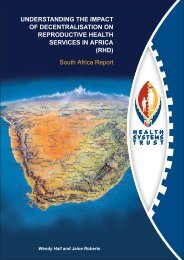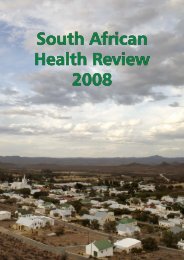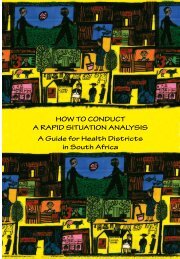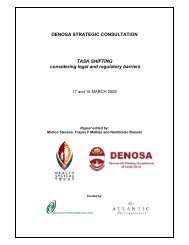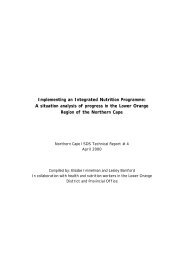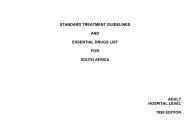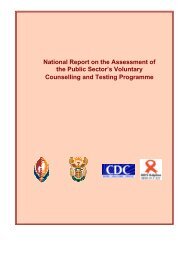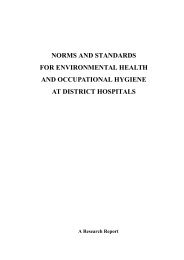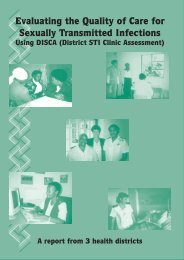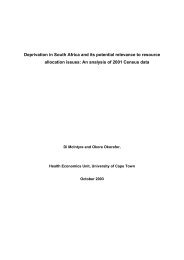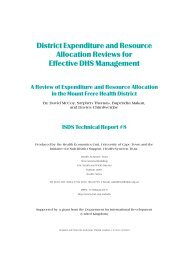SAHR 2007 - Health Systems Trust
SAHR 2007 - Health Systems Trust
SAHR 2007 - Health Systems Trust
Create successful ePaper yourself
Turn your PDF publications into a flip-book with our unique Google optimized e-Paper software.
Medical Schemes 4<br />
Further reforms to purchasing and delivery of health care are<br />
greatly needed through the reform of private sector delivery<br />
models. There is also an intention to encourage the public<br />
hospital system to become a contender for the provision of<br />
services under a mandatory contributory environment. 45<br />
The capacity of the health care provider market to absorb<br />
more lives was extensively investigated as part of the LIMS<br />
process. 26 The task groups raised a concern over the lack<br />
of human resource capacity and regional variances in<br />
capacity. A clear area of concern was in the specialised<br />
fields of nursing, dentistry, specialists and intensive unit care.<br />
The supply task group felt strongly that the provision of services<br />
to the LIMS market can only be effective and sustainable<br />
if there is transparency to the provider, patient and fund, and<br />
every attempt is made by all to reduce fraud, corruption and<br />
mismanagement throughout the entire delivery process.<br />
There are still substantial barriers to the creation of effective<br />
networks of health care in legislation and in the ethical<br />
rules of providers. Detailed recommendations were made<br />
in the LIMS process of the role that could be played by the<br />
Forum of Statutory <strong>Health</strong> Professional Councils in facilitating<br />
coordinated changes to the training and scope of practice<br />
of various health care professionals. 26 The combined agreement<br />
of the professional councils will have to be in place<br />
in order to allow for the development of innovative models<br />
such as:<br />
➤ Staff model arrangements, in which hospitals are able<br />
to employ medical and other staff in order to appropriately<br />
align incentives and thereby reduce costs.<br />
➤ Development of closed networks of hospitals, which<br />
would be operated on a low cost basis, including<br />
changes to design, operations and staffing.<br />
➤ Changes to design and operation of hospitals allowing<br />
them to operate on a similar basis to mine hospitals.<br />
These possible models are prevented by existing legislation,<br />
much of which is considered by the industry to be outdated.<br />
Legislation and regulations governing employment of and<br />
revenue sharing with health care professionals prevents the<br />
emergence of efficient, low cost integrated delivery models.<br />
Hospitals and other health care organisations are prevented<br />
from entering into employment or other revenue or profit<br />
sharing arrangements with health care professionals. This<br />
prevents the alignment of incentives that is essential for<br />
the development of low cost models. A critically important<br />
aspect is coordination with the Competition Commission<br />
and appropriate amendments to competition legislation.<br />
Priorities for consolidating medical<br />
scheme reform<br />
Medium-term reforms to transform health care financing from<br />
a voluntary system to a mandatory social insurance system<br />
with risk and income cross-subsidies have been articulated<br />
since the National <strong>Health</strong> Plan of 1994. 2,44,46,47 However,<br />
more detailed measures and short-term sequencing of<br />
reforms have not been adequately shared with stakeholders<br />
and not all recent discussion documents have been<br />
publicly released. 6 Many of the frustrations experienced by<br />
the medical schemes industry stem from a perceived lack<br />
of adequate communication and problems created by the<br />
sequencing of reforms. For example, there is a suggestion<br />
from the CMS to expand the PMBs and change option<br />
structures which increases affordability problems for low<br />
income workers, yet the income cross-subsidies which will<br />
relieve the pressure on low income workers do not seem<br />
to be progressing. Many of the reforms are interrelated or<br />
have consequences on other parts of the system so policymakers<br />
have an unenviable and difficult task in sequencing<br />
the reforms. The CMS should only be an advisor on policy<br />
matters and there is a perceived lack of resources to deal<br />
with private sector and medical scheme policy issues in the<br />
DoH.<br />
The reforms of 1998 which were implemented in 2000<br />
have had a very beneficial effect on the supervision of the<br />
industry and improved governance within medical schemes.<br />
There have also been significant but incomplete improvements<br />
in the protection of vulnerable groups like the elderly<br />
and those with chronic disease. The planned REF will further<br />
extend those protections but only to the minimum benefit<br />
package. In the medium-term, the most important goal is to<br />
move to a mandatory system for health care cover but there<br />
are still several reforms needed before mandatory cover is<br />
implemented. There are three areas of reform that should be<br />
prioritised in the short-term.<br />
1. Simplified and standardised benefit design<br />
The most important immediate priority is to simplify and<br />
standardise benefit and option structures in medical<br />
schemes. The debate on this issue began with the<br />
International Review Panel in 2004 and continued with<br />
proposals from the CMS in Circular 8 of 2006. 48,31 A<br />
greater standardisation of product offerings would<br />
greatly assist in moving medical schemes away from<br />
competition on the basis of product design (and hence<br />
on attracting particular target groups and risk-rating)<br />
67



